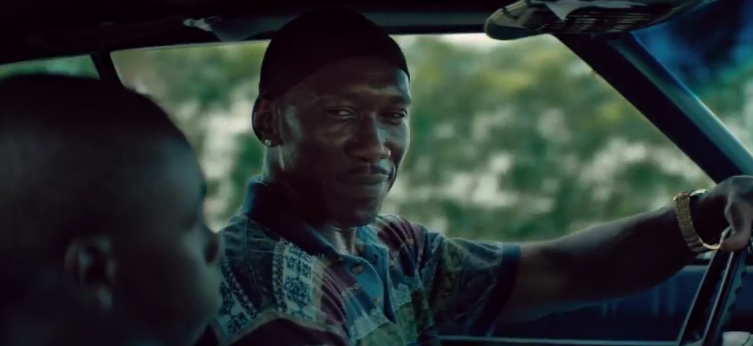
The indie drama Moonlight brings us a glimmer of gentle humanity in the crack-plagued inner city. Centered on a nine-year-old African-American boy named Chiron (pronounced shy-RONE) in South Florida, Moonlight is at once a coming of age tale, an exploration of addicted parenting and a story of gay awakening.
Chiron is a sensitive kid who is left to raise himself by his crackhead mom. Hiding from the neighborhood toughs, he is taken in by the local drug lord (Mahershala Ali – Remy in House of Cards) and his girlfriend. Given the mean streets and the neglectful mom, that actually turns out to be a good thing. The older man becomes a surrogate father and dispenses helpful advice like, “Don’t sit with your back to the door”. We also see Chiron at 17 (working on the “Questioning” part of LGBQT), and at 27, when he finally decides to address the pivotal events of his youth.
Moonlight’s director Barry Jenkins wrote the screenplay from the story by Terrell McCraney. Jenkins and McCraney did not know each other as kids, but grew up in the same period in the Miami area, and both had parents touched by the crack epidemic.
No matter how hard parents try to protect and control their kids, much of their growing up will be outside the parents’ field of vision. Kids will discover things with, learn from and be influenced by their peers. As unsettling as that is, the only alternative is to move off the grid and home school them (at the expense of socialization). The scenes in Moonlight of the 9-year-old and the 17-year-old Chiron with his friends outside the view of adults are unusually realistic narrative cinema.
Jenkins structured Moonlight in three acts, with different actors playing Chiron at age 9 (Alex Hibbert), age 17 (Ashton Sanders) and age 27 (Travante Rhodes). Likewise, Chiron’s friend Kevin is played by Jaden Piner, Jharrel Jerome and André Holland. To understand the third act (and the vanity plates on Chiron’s car), it’s important to remember that it’s Kevin who gives Chiron the nickname “Black” when everyone else calls him “Little”.
The 9-year-old Chiron’s mom is complicated – she makes him read instead of watching TV, but still ditches him when she entertains a gentleman caller. Young Mr. Hibbert’s eyes are eloquent when he looks back at his mother – he already knows that this is not the way it’s supposed to be (and she hates that he knows). The teenage Chiron’s mom has lost all control and is her son’s worst nightmare – a totally consumed crackhead like Samuel L. Jackson’s Gator in Jungle Fever.
The best aspect of Moonlight is its treatment of bullying and Chiron’s sexual questioning and awakening. We feel, even relive, the dread of childhood bullies. Moonlight’s treatment of growing up gay, especially gay and African-American is extraordinarily sensitive and even revelatory.
This is an important film, but its effectiveness grinds down in the third act. The first, 9-year-old segment is absorbing. The second, teenage sequence does an adequate job on the bullying and a stellar job on the sexuality. To that point, we really care about Chiron, and we’re on the edges of our seats rooting for his survival. But then Travante Rhodes takes over the character of Chiron as a grown man who is trying to be the Mahershala Ali character but looks and walks like Mike Tyson; Rhodes’ eyes and face don’t bring us in as do the younger actors. The lifestyle choice that Chiron has made after his teens and his roadtrip to self-discovery are interesting but not compelling, and Moonlight’s urgency peters out.
I’m a contrarian here: Moonlight has gotten rapturous acclaim, notably, from the critics that I respect the most, A.O. Scott, Mick LaSalle, Sheila O’Malley, Richard Roeper, Tim Sika and others. It has Metacritic rating of NINETY-NINE! But, leaving the theater, The Wife’s first comment was, “I feel like I just ate my broccoli,” and I agreed with her.
The casting is ALMOST perfect. Young Hibbert and Jerome are exceptional and all the Chiron/Kevin actors are good, except for Rhodes. Mahershala Ali’s drug dealer moves with a lion’s top-of-the-food-chain insouciance, but his moment when the young Chiron asks him “Does my mom do drugs?” and a very direct follow-up question is heartbreaking. The very sleek British actress Naomie Harris (Some Kind of Traitor) is unrecognizable as the crackhead mom – a very strong performance. The singer Janelle Monáe is very appealing in her turn as the drug dealer’s girlfriend.
Moonlight deserves praise for its realism and insight, but loses its punch in the final twenty-five minutes.
